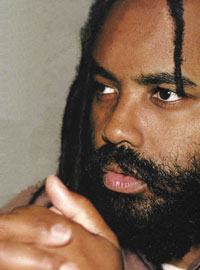Murdered policeman's widow tells of 26 years of being haunted by mumia
The murder of a white police officer by a former Black Panther has been investigated for more than two decades.

Mumia Abu-Jamal's fatal shooting of Daniel Faulkner has become one of the most prominent death row cases in the world. But throughout 26 years of litigation, one part of the story has been largely overshadowed.
The officer's widow, Maureen Faulkner, talks about her side of the case in "Murdered by Mumia: A Life Sentence of Loss, Pain and Injustice," a book written with political pundit and conservative radio talk-show host Michael Smerconish. The book is being released Thursday by a small publisher, The Lyons Press, an imprint of The Globe Pequot Press.
"It's been a therapy for me. It really has. The truth is now on paper on what happened the night Danny was murdered," Faulkner said in a recent interview.
The memoir chronicles Faulkner's attempt to rebuild her life as she fights Abu-Jamal's numerous appeals, travels the country to debunk what she calls myths about the case and strives to ensure that her husband is not forgotten.
Daniel Faulkner was a 25-year-old newlywed when he was gunned down Dec. 9, 1981. A jury concluded Abu-Jamal shot Faulkner several times after seeing the officer scuffle with Abu-Jamal's brother, who had been pulled over in downtown Philadelphia. The verdict has withstood numerous appeals.
But Abu-Jamal, a one-time journalist, has garnered worldwide support for claims that he was the victim of a biased U.S. justice system. His message has resonated particularly on college campuses and in the movie and music industries - actors Mike Farrell and Tim Robbins were among dozens of luminaries who used a New York Times ad to advocate for a new trial, and the Beastie Boys played a concert to raise money for Abu-Jamal's defense fund.
Over the years, Abu-Jamal has challenged the predominantly white makeup of the jury, instructions given to jurors and the statements of eyewitnesses. He has also alleged ineffective counsel, racism by the trial judge and that another man confessed to the crime.
In 2001, a federal judge upheld Abu-Jamal's conviction but overturned his death sentence because of flawed jury instructions. Prosecutors are now trying to get the sentence reinstated, while Abu-Jamal continues to fight for a new trial.
Smerconish, who is also a lawyer and newspaper columnist, read the entire 5,000-page case file before offering to help Faulkner tell her story. In an interview, he spoke of his admiration for Faulkner - who he said has been smeared, threatened and spit on by Abu-Jamal supporters - and what he called her David vs. Goliath odyssey to fight the "Free Mumia" movement.
Like the time she called Continental Airlines to berate the company for allowing an Abu-Jamal benefit concert to be held at Continental AirlinesArenain New Jersey. Or the time she showed up at the commencements of Antioch College in Ohio and Evergreen State College in Washington to protest their choice of Abu-Jamal as a speaker (by tape).
Or the time she hired a plane to fly around the offices of Addison-Wesley, the company that published Abu-Jamal's book, "Live From Death Row." The plane towed a banner that said, "ADDISON-WESLEY SUPPORTS COP KILLER."
"Every instance where she's sort of outmanned and outgunned and outfunded, somehow she digs deep and she gets it done," Smerconish said.
Neither Abu-Jamal nor his brother have ever spoken about what happened that night. The book emphasizes that point, noting that in 26 years, Abu-Jamal has only proclaimed his innocence. His brother has said that he had nothing to do with the murder.
Yet Abu-Jamal has become a celebrity, receiving the kind of publicity that still brings Faulkner to tears. She writes of the gut-wrenching shock of hearing Abu-Jamal's voice in a radio commentary, the anger of seeing pro-Abu-Jamal graffiti on a southern California freeway, and the frustration of running into someone in a "Free Mumia" T-shirt at the gas station.
Faulkner asked that young man what he knew about the case. When he responded that Abu-Jamal was a political prisoner who had been railroaded, Faulkner identified herself as the victim's widow.
"He looked at me with a shocked look on his face," Faulkner recalled. She said she told him that he was misinformed about the case, and offered to send him the trial transcripts. "He said, 'No, that's OK,' and he hopped in his car and he drove away."
Faulkner bristles at suggestions that her crusade has been about self-promotion or money. She said she has never earned a penny from her husband's death, and noted all book proceeds will benefit the Justice for Daniel Faulkner Foundation, which supports the children of Philadelphia murder victims.
She stressed that she is "not one of these grieving widows," and that she has filled her life with family, friends, work and world travel.
"I've lived a very fulfilling life. I'm a happy person," Faulkner said. But then she'll get another upsetting call, like the one last week in which she found out that a film about Abu-Jamal had been accepted at the Sundance film festival. Faulkner cried as she talked about having to battle the "Free Mumia" forces yet again.
That is why, Faulkner said, she still needed to write a book 26 years later.
"This is the stuff that goes on in my life all the time," she said. "My life is just never normal."
Abu-Jamal, 53, remains incarcerated at the state prison in Waynesburg, 265 miles (426 kilometers) west of Philadelphia. He has written several books and does frequent radio commentaries for the Prison Radio project.
Subscribe to Pravda.Ru Telegram channel, Facebook, RSS!


